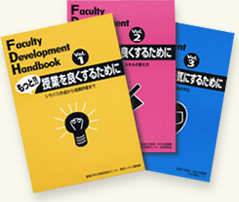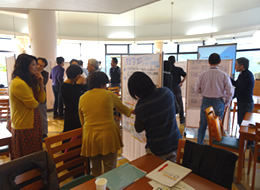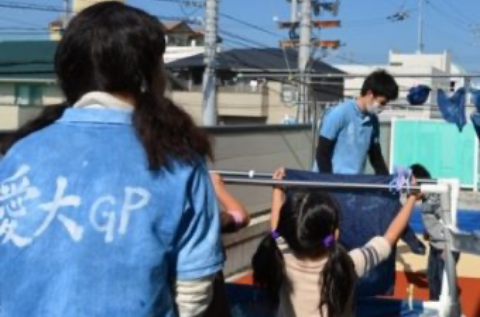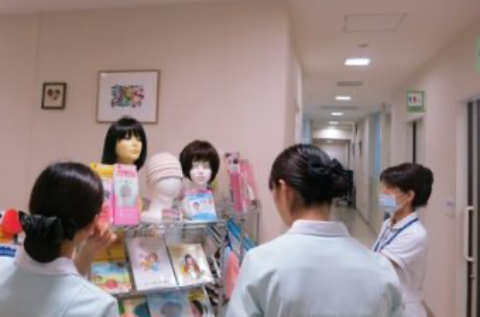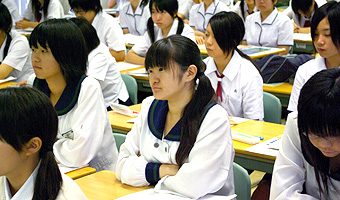Special Efforts
Educational Reform Initiatives
Enhancement of educational capabilities through capacity building of faculty and staff (FD/SD/TAD)
Ehime University aims to improve the quality of education by having faculty, administrative staff, and teaching assistants share Ehime University’s philosophy and goals and work together to develop their skills.
For example, with regard to faculty development (FD), the Education Planning Office of the Institute for Education and Student Support conducts various workshops and consultations for faculty members to improve classes and teaching methods, curriculum improvement, and organizational development and reform.
These efforts have attracted considerable external attention, including being adopted as Good Practice (GP) by the Ministry of Education, Culture, Sports, Science and Technology (MEXT), and being featured in newspapers and magazines.
Promotion of educational reform while organically linking the entire university (educational coordinator system)
Education coordinators are education-focused faculty members who are responsible for education in faculties, departments, etc., and play a central role in activities such as planning educational policies, organizing curricula, improving educational content and teaching methods, and verifying educational effectiveness. Currently, approximately 60 of them are appointed by the president of the university as a whole.
The coordinators of each faculty are members of the Education and Student Support Council, the governing body of the Education and Student Support Organization, which deliberates on university-wide educational issues, and the entire university is organically connected to promote educational reform.
In addition, the Office for Educational Planning And Research holds educational coordinator training sessions to facilitate communication among educational coordinators and to ensure a common understanding of the direction of reform. Each educational coordinator conducts activities in each faculty and department based on the knowledge and skills gained at these training sessions.
Each year, the theme of the training session is a university-wide and important educational issue.
| Held in 2006 (once a year) | “Curriculum Systematization and Credit Substantiation” |
|---|---|
| Held in 2007 (5 times per year) | Systematization of the Bachelor’s Program: Formulation of Diploma Policy, Curriculum Policy, and Admission Policy (DP, CP, AP) and building coherence. |
| Held in 2008 (4 times a year) | Curriculum Systematization and Classroom Improvement: Curriculum Mapping and Teaching Portfolio Development |
| Held in 2009 (4 times per year) | Systematization of Bachelor’s Course Education: Curriculum Assessment and Substantiation of Credit System |
| Held in 2010 (5 times per year) | “PDCA Cycle and Substantiation of Credit System” |
| Held in 2011 (5 times a year) | Cultivation of generic skills in general education: Toward the construction of a new concept of “liberal arts”. |
| FY 2012 (5 times per year) | Development of General Competencies in Graduate Programs” |
| Held in 2013 (5 times per year) | “Developing Versatile Competencies in Undergraduate Specialized Education” |
| Held in 2014 (5 times a year) | Micro-level FD: Strategies for Quality Assurance of Student Learning |
| Held in 2015 (4 times a year) | “The Future of Admission Selection at Ehime University: Substantiation of the Admission Policy Based on the “Three Elements of Academic Achievement””. |
| Held in fiscal year 2008 (4 times a year) | Reform of Entrance Examinations at Ehime University: Focusing on the High School-University Connection” |
| Held in fiscal year 2009 (4 times a year) | Admission Reform at Ehime University: Basic Direction toward the Implementation of the “New Entrance Examination” and Embodiment of the Admission Policy” (in Japanese) |
| Fiscal Year 2008 (5 sessions per year) | Student Support and Crisis Management.” |
| Held four times a year in 2048 | Student Support and Crisis Management |
| Held once a year in 2020 | Student Support and Crisis Management, Academic Risk and Student Support at Corona Disaster |
| Held in FY2021 (3 times per year) | Development of draft assessment plans for all university and degree programs. |
| Held in FY2022 (3 times a year) | Promotion of the Plan for the Fourth Medium-Term Objectives Period |
| Held in 2023 (3 times a year) | Promotion of Student Support and Digitalization |
| Held three times in 2024 | Reform of Common Education: Toward Common Courses for Graduate Schools |
Priority allocation of educational expenses to excellent educational reform programs (Ehime University Educational Reform Promotion Program (Ehime University Educational Reform GP))
The Ehime University Educational Reform Promotion Project (Ehime University Educational Reform GP) is a program that focuses on outstanding educational reform initiatives with a broad national and international perspective and allocates educational expenses in a priority manner.
The open call for applications is open to “organizational-based educational reform efforts in undergraduate and graduate programs,” “organizational efforts to achieve the goals set forth in the mid-term plan and to respond to educational policy,” “efforts by one or a relatively small group of faculty members to develop and improve classes,” and “efforts by one or a relatively small group of faculty members to develop and improve classes,” and “efforts by one or a relatively small group of faculty members to promote international exchange students and study abroad. There are four types of initiatives: “Organized initiatives to achieve goals and respond to education policy,” “Initiatives by one or a relatively small group of faculty members to develop and improve classes,” and “Initiatives by one or a relatively small group of faculty members to accept international students and develop new study abroad programs.
After the call for proposals is received, the Educational Reform Promotion Project Review Committee, established under the President, conducts a review and determines which proposals will be adopted. The person responsible for implementing the adopted project submits a report on the results of the project every fiscal year, and announces the progress and results at an open symposium on educational reform.
History of Educational Reform at Ehime University
Ten years have passed since the establishment of the Comprehensive Center for University Education (now the Education and Student Support Organization) in 2001 and the establishment of the university-wide mobilization system for common education. On this occasion, we have compiled the history of Ehime University’s educational reforms and compiled the details of reforms and reorganizations into a systematic document.
We hope that you will read this booklet, which summarizes the history of Ehime University’s educational reforms, and at the same time, serves as a reference for other universities as an example of educational reforms.
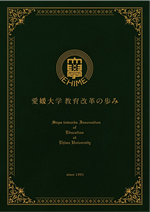
High School-University Cooperative Activities
High school-university cooperative activities are educational activities conducted in cooperation between high schools and universities. At TUAT, each department offers a variety of mock lectures and information sessions for high school students and others. By exposing high school students to university-level studies, they are able to deepen their understanding of their field of interest and gain a thorough understanding of the characteristics of the department they wish to enter, which is expected to help them in their career choices.
On the other hand, the university learns about high school education and understands the current situation, which is useful for improving educational methods, curriculum, and other aspects. In addition, the university’s high school-university cooperative activities, which promote the creation of a university closely connected to the local community, also have the aspect of contributing to the community and society.
Ehime University Initiatives
Ehime University has concluded an “Agreement on High School-University Cooperative Cooperation” with the Ehime Prefectural Board of Education.
With the conclusion of this agreement, the University has expanded its “visiting lecture” program as part of the “High School-University Collaboration Program.” Faculty members from the University visit high schools and other institutions to give “mock classes” introducing various aspects of the University’s research.


